Why is the "ground" of the input capacitor "hot ground" after AC-DC conversion
Time:2022-06-09
Views:2111
The small partner in power R & D must have heard not to be wrongly grounded. The capacitor ground and ground behind the rectifier bridge cannot be connected together, otherwise it will cause a short circuit. Today, I just want to understand this problem. I will record it. If there is any mistake, I hope you can correct it.
First, let‘s take a look at the schematic diagram of AC-DC (full wave rectification):
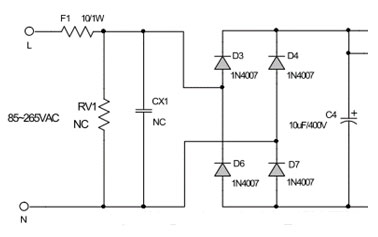
Let‘s take a look at the action process of the rectifier bridge when the input terminal is AC220V:
1. When AC220V is a positive half cycle, the ground of the filter capacitor C4 behind the rectifier bridge is connected to the zero line n. at this time, the ground of the filter capacitor C4 is connected to the ground.
As shown below:
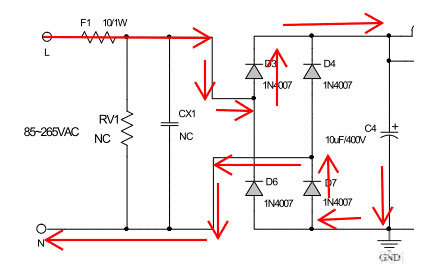
2. When AC220V is a negative half cycle, the ground of the filter capacitor C4 behind the rectifier bridge is connected to the live line L. at this time, the ground of the filter capacitor C4 is connected to the live line.
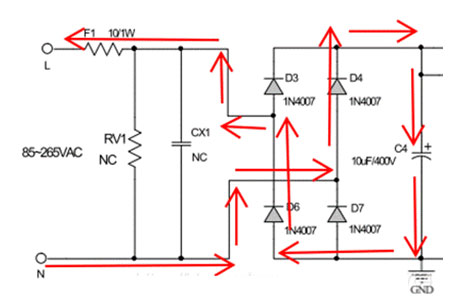
We know that the potential of the earth (PE) is 0V, so the voltage waveform of the negative pole (GND) of C4 from the earth is the following blue line:
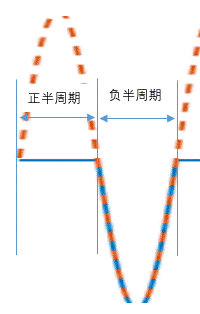
We can see from the above figure that during full wave rectification, GND of filter capacitor C4 has voltage relative to the earth (PE), so connecting the two together will certainly cause a short circuit.
Therefore, GND after full wave rectification is also very dangerous. This may also be the reason why it is called "hot land".
Let‘s continue to look at the schematic diagram of non isolated buck circuit:

We can see that the GND of the low-voltage 12V output is connected to the GND of the filter capacitor at the input end. Therefore, in the non isolated buck circuit, when the input end is full wave rectification, the ground at the low-voltage side is also "hot", which is very dangerous~
Take another look at the buck schematic diagram of the isolation style:
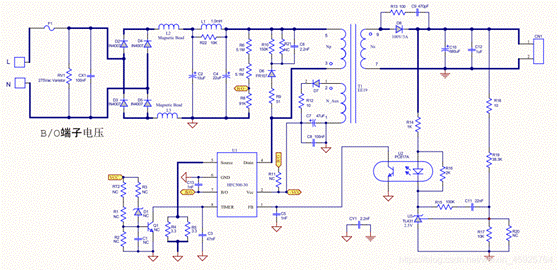
We can see that the GND of the low-voltage output side is separated from the GND of the input filter capacitor. The low-voltage side is equivalent to being powered by the secondary side winding (the secondary side winding can be regarded as a battery). At this time, the ground of the low-voltage side is equivalent to a suspended (floating) ground. At this time, the low-voltage side is relatively safe, so the GND of the low-voltage side should be connected to the earth~
The above is full wave rectification. Let‘s think about it again. What about half wave rectification?
In case of AC negative half cycle, the circuit has no path, and the GND of filter capacitor C4 is equivalent to suspension. When the AC positive half cycle comes, it will be reconnected with the earth (PE),
So in the circuit of half wave rectification, the landform after rectification seems to be safe. Is this actually the case?
I think if the live line and zero line are correctly connected to the power grid, it is safe.
But... Once the plug is connected reversely, that is, the live wire L in the circuit is connected to N in the power grid, and N is connected to L in the power grid. (this is likely to happen in actual use)
At this time, the rectified ground is connected to the live wire of the power grid... So it is also very dangerous.
So the ground after half wave rectification is also a "hot ground", which is very dangerous
To conclude:
1. Whether full wave rectification or half wave rectification, the ground after rectification is "hot ground"
2. There is voltage between the "hot earth" and the earth, which can not be connected together and will be short circuited.
3. The power ground after non isolated DCDC conversion is also a "hot ground".
4. After isolated DCDC conversion, the ground on the low-voltage side is "floating ground", and I think the "floating ground" can be connected to the ground.
The above is my little experience. Please give me some advice~
First, let‘s take a look at the schematic diagram of AC-DC (full wave rectification):

Let‘s take a look at the action process of the rectifier bridge when the input terminal is AC220V:
1. When AC220V is a positive half cycle, the ground of the filter capacitor C4 behind the rectifier bridge is connected to the zero line n. at this time, the ground of the filter capacitor C4 is connected to the ground.
As shown below:

2. When AC220V is a negative half cycle, the ground of the filter capacitor C4 behind the rectifier bridge is connected to the live line L. at this time, the ground of the filter capacitor C4 is connected to the live line.

We know that the potential of the earth (PE) is 0V, so the voltage waveform of the negative pole (GND) of C4 from the earth is the following blue line:

We can see from the above figure that during full wave rectification, GND of filter capacitor C4 has voltage relative to the earth (PE), so connecting the two together will certainly cause a short circuit.
Therefore, GND after full wave rectification is also very dangerous. This may also be the reason why it is called "hot land".
Let‘s continue to look at the schematic diagram of non isolated buck circuit:

We can see that the GND of the low-voltage 12V output is connected to the GND of the filter capacitor at the input end. Therefore, in the non isolated buck circuit, when the input end is full wave rectification, the ground at the low-voltage side is also "hot", which is very dangerous~
Take another look at the buck schematic diagram of the isolation style:

We can see that the GND of the low-voltage output side is separated from the GND of the input filter capacitor. The low-voltage side is equivalent to being powered by the secondary side winding (the secondary side winding can be regarded as a battery). At this time, the ground of the low-voltage side is equivalent to a suspended (floating) ground. At this time, the low-voltage side is relatively safe, so the GND of the low-voltage side should be connected to the earth~
The above is full wave rectification. Let‘s think about it again. What about half wave rectification?
In case of AC negative half cycle, the circuit has no path, and the GND of filter capacitor C4 is equivalent to suspension. When the AC positive half cycle comes, it will be reconnected with the earth (PE),
So in the circuit of half wave rectification, the landform after rectification seems to be safe. Is this actually the case?
I think if the live line and zero line are correctly connected to the power grid, it is safe.
But... Once the plug is connected reversely, that is, the live wire L in the circuit is connected to N in the power grid, and N is connected to L in the power grid. (this is likely to happen in actual use)
At this time, the rectified ground is connected to the live wire of the power grid... So it is also very dangerous.
So the ground after half wave rectification is also a "hot ground", which is very dangerous
To conclude:
1. Whether full wave rectification or half wave rectification, the ground after rectification is "hot ground"
2. There is voltage between the "hot earth" and the earth, which can not be connected together and will be short circuited.
3. The power ground after non isolated DCDC conversion is also a "hot ground".
4. After isolated DCDC conversion, the ground on the low-voltage side is "floating ground", and I think the "floating ground" can be connected to the ground.
The above is my little experience. Please give me some advice~
|
Disclaimer: This article is transferred from other platforms and does not represent the views and positions of this site. If there is infringement or objection, please contact us to delete. thank you! |











